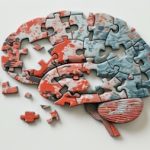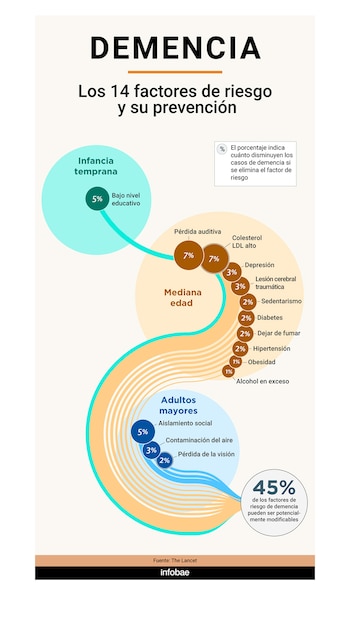







Each September 21 commemorates the World Day of Alzheimer’san initiative dedicated to raising awareness about dementias and promote a more inclusive and supportive society with people living with this disease, states the Pan American Health Organization (PAHO). The campaign message states: “It’s time to act on dementia” and one of the pillars of this objective is the prevention.
A recent magazine publication The Lancet showed that up to 45% of all dementias could be delayed, slowed down or even prevented. Experts recommend control risk factors that can predispose to the development of this disease and other types of dementia, and they highlighted the importance of doing so from early ages with non-pharmacological interventions linked to feedingto physical activity and a healthy lifestyle.
The doctor Janus Kremerneurologist, director of the Kremer Institute of Neuropsychiatry of Córdoba, said: “In ArgentinaAlzheimer’s affects about 300,000 people and it is the fifth cause of death. Cognitive disorders, Alzheimer’s and dementias in general are multifactorial disorders that require a multidisciplinary approach”.

At a global level, Alzheimer’s represents between 60% and 70% of all dementia cases. In the world, more than 44 million people live with dementia and, each year, about 10 million new diagnoses.
Although the mechanisms involved in its development are not yet known in depth, some risk factors for Alzheimer’s that are “non-modifiable” have been identified, such as advanced age, background Alzheimer’s relatives, genetic predisposition and the presence of mild cognitive impairment.
On the other hand, multiple reviews of the literature and various meta-analyses made it possible to determine, as published The Lancetthat there are 14 factors – common to all dementias – that are modifiable:

- High blood pressure
- Diabetes
- Obesity
- Smoking
- Excessive alcohol consumption
- Physical inactivity
- hearing loss
- visual loss
- Social isolation
- Depression
- Low educational level
- blows to the head
- Environmental pollution
- Increased LDL cholesterol

The doctor Maria Cecilia Fernandezneurologist, Head of the Memory and Behavior Disorders Section of the Italian Hospital of Buenos Aires, expressed: “The best strategy to avoid the development of Alzheimer’s is to maintain a healthy quality of life from the earliest possible ageand this includes behaviors related to greater physical activityparticipate in social gatherings and perform activities that stimulate the brain, adopt patterns of healthy eatingmaintain a adequate body weight, no smoking and moderate alcohol intake, visit the doctor periodically (the ophthalmological control a preventive intervention that until recently was not taken into account) and take in a timely manner the medications that this indicates.”
The Lancet Commission’s 2024 update created an infographic with the best preventative measures, based on age. It is shown by a percentage how much the risk of developing dementia is reduced by completely eliminating certain factors.
Some of them, such as traumatic brain injuries or air pollution, are not completely under our control, but there are several that are modifiable, for example, being physically active and following a healthy diet.

Thus, depending on age, the 14 risk factors to modify and control are:
- In early life: education
- In middle age: hearing loss, traumatic brain injury, high cholesterol, hypertension, alcohol abuse, and obesity
- In adulthood: smoking, depression, social isolation, vision loss, sedentary lifestyle, diabetes and air pollution
Among the interventions related to feedingthe adoption of a diet that includes fish and other seafood, white meat, olive oil, fresh vegetables and fruits, and dairy products stands out. There are studies that showed that Mediterranean dietspecifically, is associated with a reduction of up to 40% in the risk of developing cognitive impairment and Alzheimer’s.

“This strategy of balanced, varied and nutritious diet It contributes to maintaining an adequate body weight and preventing a number of diseases, such as cardiovascular diseases and dementia, especially if it is implemented early, in the initial stages or even before the development of the disease. Anyway, It’s never too late to improve your lifestyle”added Dr. Janus Kremer.
Within the framework of non-pharmacological interventions, the incorporation of a nutritional supplement which includes omega 3, choline, uridine monophosphate, vitamins B, C, E and selenium – which has been scientifically proven to improve synapse (neural connections) – can help prevent or delay the progression of conditions related to cognitive impairment and dementia.
“The measures included in this outline of recommendations must be implemented as soon as possible – the sooner, the better – and be sustained over time. They should ideally be started before symptoms of deterioration begin to appear. They can be extremely useful to contribute to improving health and quality of life,” said Dr. Fernández, who is also Head of Cognitive Neurology at the Italian Hospital.

Both specialists agreed that, once the risk factors for developing dementia have been clearly established, “the key becomes identifying patients at risk and taking the necessary preventive measures. In this aspect, it is necessary that clinical doctors, cardiologists, gynecologists, gerontologists and other specialties have a holistic, comprehensive viewof the health of their patients and can consider this problem before it appears, in addition to warning early about any type of mild cognitive impairmentto make a timely referral to a neurology specialist.”
There are certain subtle changes that may be reflecting a picture of mild cognitive impairment, which goes beyond the healthy aging and that could evolve over time towards dementia: signs such as difficulty expressing words, forgetting things or attending certain events.
“Although each case is individual and the approach must be treated in a personalized manner in the office – in general terms – as part of the treatment, in addition to the behaviors aimed at modify risk factorswe recommend some specific actions such as carrying an active lifesustain the activities that represent pleasurelook for new ways to keep your mind active and spend more time with friends and family”, concluded doctors Fernández and Kremer.
